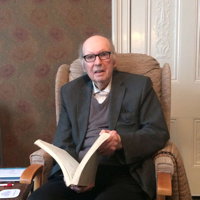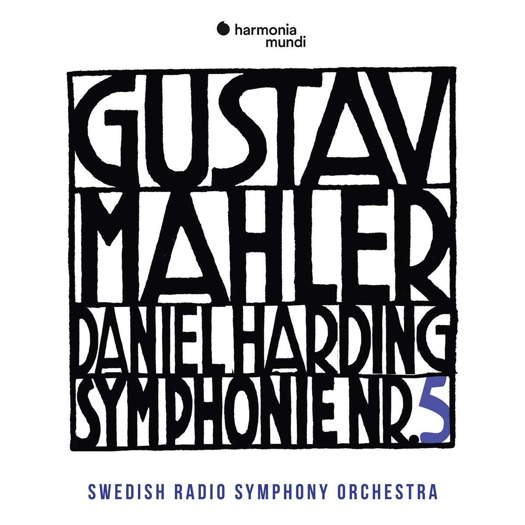- Ingrid Haebler
- Malcolm Miller
- Gerontius
- Charles Mackerras
- Ates Orga
- Heino Eller
- Edmund Rubbra
- Johann Stamitz
 SPONSORED: Profile. A Gold Mine - Roderic Dunnett visits Birmingham to talk to John Joubert.
SPONSORED: Profile. A Gold Mine - Roderic Dunnett visits Birmingham to talk to John Joubert.
All sponsored features >>
 DISCUSSION: John Dante Prevedini leads a discussion about Composers, individuals or collective?, including contributions from David Arditti, Halida Dinova, Robert McCarney and Jane Stanley.
DISCUSSION: John Dante Prevedini leads a discussion about Composers, individuals or collective?, including contributions from David Arditti, Halida Dinova, Robert McCarney and Jane Stanley.


A Compelling New Reading
ANETT FODOR is impressed by Daniel Harding
and the Swedish Radio Symphony Orchestra's
recent recording of Mahler's Fifth Symphony
'Daniel Harding awakens and keeps the listener's curiosity captive, demanding thorough attention for his compelling interpretation.'
and the Swedish Radio Symphony Orchestra's
recent recording of Mahler's Fifth Symphony
'Daniel Harding awakens and keeps the listener's curiosity captive, demanding thorough attention for his compelling interpretation.'
Music is said to be the oldest healing therapy. Maybe that was why Gustav Mahler (1860-1911) wove so many contradictory feelings of his life into this work. Both in lyrical and dramatic passages myriads of timbres, catchy melodies and amazingly new harmonies thrill the listener.
Listen — Mahler: Trauermarsch (Symphony No 5)
(track 1, 0:02-0:58) © 2018 harmonia mundi sas :
Owing to many wandering melodies amongst different instruments, this symphony might sound chaotic at first. However, thanks to the excellent orchestral musicians' and the conductor's impressive vision one is aware of the outstanding logical order in its unique orchestration and artistic innovations.
As far as the innovations are concerned, Mahler was fully aware that his Fifth Symphony was ahead of its time. After the premiere (in 1904), he said: 'Nobody understood it. I wish I could conduct the first performance fifty years after my death.'
Mahler's Fifth Symphony is one of his most popular and most recorded works. He composed it during the period 1901/2. These were momentous years in his private as well as professional life. Only a few months before embarking on it he had suffered a massive haemorrhage. The closeness of death had shocked him. Later that same year he met his future wife, Alma Schindler. They soon married in the summer of 1902.
Daniel Harding was born in Oxford. Aged seventeen, he formed a group of musicians to perform Schoenberg's Pierrot Lunaire. He sent a recording of the performance to Simon Rattle, who hired Harding as an assistant to him at the City of Birmingham Symphony Orchestra for a year (1993/4). After this wonderful introduction to his future career, he started university studies in Cambridge. At the end of his first year, Claudio Abbado named him his assistant with the Berlin Philharmonic Orchestra. Harding's career has continued to be as outstanding as its amazing beginning. He has been a Seiji Ozawa Fellow in conducting at Tanglewood Music Centre, Music Director of the Ojai Music Festival, Trondheim Symphony Orchestra, Deutsche Kammerphilharmonie Bremen and the Mahler Chamber Orchestra, with which he now holds the title of Conductor Laureate.
Harding was appointed as Principal Guest Conductor of the London Symphony Orchestra from 2006. He became the Principal Conductor of the Swedish Radio Symphony Orchestra in 2007, which will continue until 2023. In 2018 they announced his new title of Konstnärlig Ledare (Artistic Leader). Harding was appointed as the 9th principal conductor of the Orchestra de Paris, from 2016 to the close of the 2018-2019 season. Outside Europe, Harding was given the title of Music Partner of the New Japan Philharmonic in 2010 and in 2012 he became Artistic Director of the Ohga Hall in Karuizawa, Japan.
Daniel Harding is a trained airline pilot, although one wonders when he found the time to master this skill in such a busy career! In this excellent recording, he brilliantly navigates the Swedish Radio Symphony Orchestra through the Fifth Symphony's densely woven musical landscape.
Listen — Mahler: Stürmisch bewegt (Symphony No 5)
(track 2, 12:30-13:29) © 2018 harmonia mundi sas :
The work's structure and texture differ significantly from its Classical and Romantic predecessors. It is rather long and complex. Unusually, Mahler divided the symphony's five movements into three lengthy parts: Part I Trauermarsch (Funeral March); Stürmisch bewegt mit größter Vehemenz (Moving stormily with the greatest vehemence); Part II Scherzo; and Part III Adagietto; Rondo-Finale.
Mr Harding is a great master of building tension. Whilst a whole gamut of emotions, mood swings and emotional highs and lows permeate the composition, tension is palpable to its last sound. Although his wide dynamic range, unexpectedly strong accents and expressive tempo changes sometimes surprised me, I became immensely captivated by them.
Listen — Mahler: Rondo-Finale (Symphony No 5)
(track 5, 13:51-14:51) © 2018 harmonia mundi sas :
With all of these artistic means he brings unique character to the work. Daniel Harding awakens and keeps the listener's curiosity captive, demanding thorough attention for his compelling interpretation.
Hungary


